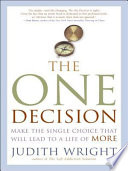

At the core of 'The One Decision' is the concept that every moment of our lives is shaped by the decisions we make. The book emphasizes that decision-making is not just about the choices we face but also about understanding the underlying principles that guide those choices. The authors argue that the ability to make effective decisions is crucial for personal and professional success. They introduce a framework that helps readers analyze their decisions by considering the long-term implications and aligning them with their core values and goals. This idea encourages readers to take a step back and assess how their daily choices contribute to their overall life trajectory, fostering a mindset of intentionality and purpose.
Continue readingThe book stresses the importance of aligning decisions with personal values. It introduces the concept of a 'decision filter' that helps individuals evaluate their options based on how well they resonate with their core beliefs and values. This alignment ensures that decisions are not made in a vacuum but are reflective of one's true self. The authors provide practical exercises to help readers identify their values and apply them to everyday decisions. This approach not only enhances personal satisfaction but also leads to more authentic and fulfilling life choices.
Continue readingMindset plays a pivotal role in how decisions are made and perceived. The authors discuss the difference between a fixed mindset and a growth mindset, illustrating how a growth mindset can lead to more flexible and adaptive decision-making. By fostering a growth mindset, individuals can embrace challenges, learn from failures, and approach decisions with a sense of curiosity and optimism. This idea encourages readers to cultivate resilience and adaptability, which are essential traits for navigating the complexities of modern life.
Continue readingEmotional intelligence is highlighted as a critical component of effective decision-making. The authors explain that understanding and managing one's emotions, as well as empathizing with others, can significantly influence the quality of decisions. They provide insights into how emotional intelligence can be developed and leveraged to improve interpersonal relationships and collaborative decision-making. This idea underscores the importance of self-awareness and social awareness in both personal and professional contexts, promoting a holistic approach to decision-making.
Continue readingEvery decision carries consequences, both immediate and long-term. The book encourages readers to consider the ripple effects of their choices, urging them to think beyond the short-term benefits. The authors present case studies and examples that illustrate how seemingly small decisions can lead to significant outcomes over time. This idea serves as a reminder to approach decision-making with a long-term perspective, weighing potential risks and rewards carefully.
Continue readingReflection is presented as a vital practice for improving decision-making skills. The authors advocate for regular reflection on past decisions to identify patterns, learn from mistakes, and celebrate successes. They provide practical tips for incorporating reflection into daily routines, emphasizing that this practice can lead to greater self-awareness and improved future decision-making. This idea highlights the value of learning from experience and encourages a continuous improvement mindset.
Continue readingThe book concludes with a focus on the importance of creating a supportive environment for decision-making. The authors suggest that surrounding oneself with diverse perspectives and fostering open communication can lead to better decisions. They provide strategies for building a collaborative culture, whether in personal relationships or professional settings. This idea emphasizes the collective nature of decision-making and the benefits of leveraging the wisdom of others.
Continue readingThe reading time for The One Decision depends on the reader's pace. However, this concise book summary covers the 7 key ideas from The One Decision, allowing you to quickly understand the main concepts, insights, and practical applications in around 22 min.
The One Decision is definitely worth reading. The book covers essential topics including The Power of Decision-Making, Aligning Decisions with Values, The Role of Mindset in Decision-Making, providing practical insights and actionable advice. Whether you read the full book or our concise summary, The One Decision delivers valuable knowledge that can help you improve your understanding and apply these concepts in your personal or professional life.
The One Decision was written by Judith Wright.
If you enjoyed The One Decision by Judith Wright and want to explore similar topics or deepen your understanding, we highly recommend these related book summaries:
These books cover related themes, complementary concepts, and will help you build upon the knowledge gained from The One Decision. Each of these summaries provides concise insights that can further enhance your understanding and practical application of the ideas presented in The One Decision.